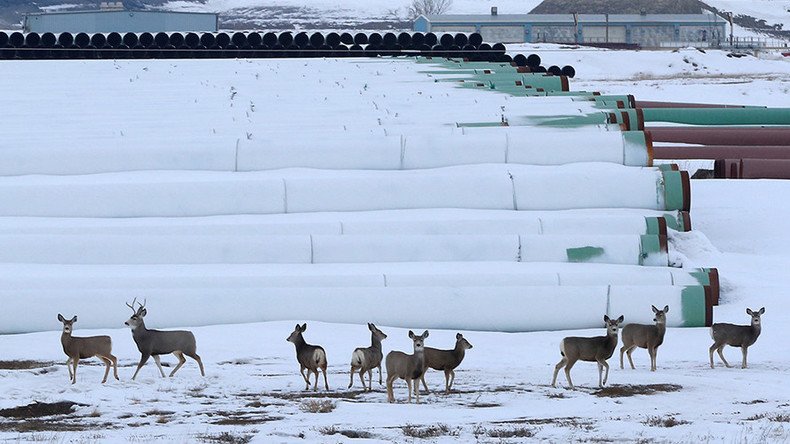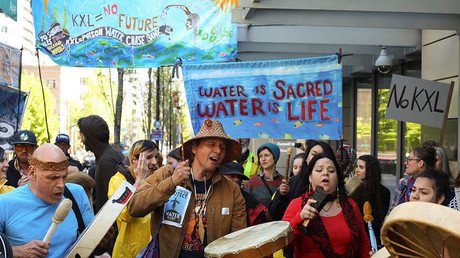'Simply no need': Keystone XL pipeline opponents not allowed to testify in Nebraska hearings

Dozens of landowners opposed to the nearly completed Keystone XL Pipeline won’t be allowed to give testimony at the upcoming hearings. That is, unless Nebraska regulators overturn a ruling that narrows down what subject matter will be permitted.
The five-member Public Service Commission in Nebraska has scheduled hearings to take place from August 7-11, before a decision on the final route of TransCanada Corp’s Keystone XL pipeline through the state.
However, this week, a retired judge who is overseeing the hearings, ruled that the pipeline’s opponents can not use some of their pre-written testimony, which stated that there was no market need for the pipeline. The commission notified 25 landowners who planned to use the testimony. The judge referred to the Major Oil Pipeline Siting Act of 2011 for her decision.
The five members are expected to announce their final decision on the matter on November 28, according to InsideClimate News.
Lawyers for TransCanada challenged the opponents’ claim and told the commission that the subject is outside their scope of consideration. The commission ultimately agreed, according to records seen by Reuters.
The goal of the five-member commission is to decide whether the pipeline is in the public interest of Nebraskans. Jobs, revenues and other issues impacting the local economy will be taken into account. The members are barred from considering issues that exist outside that remit.
The commission is also not permitted to consider any environmental issues due to the fact that the pipeline route already obtained an environmental permit.
“There is simply no need for the Keystone XL pipeline based on the current market conditions, which even TransCanada has admitted,” one of the landowner’s, Lorne Stockman, who has been blocked from testifying on the project’s economics, said, according to Reuters. “It’s no wonder they don’t want me to testify.”
US approves #Alaska offshore oil & gas #drilling, enraging environmental groups https://t.co/GdBFWRZWdopic.twitter.com/JZiyzKWK28
— RT America (@RT_America) July 14, 2017
However, TransCanada says that they have “good support” from shippers, and they are committed to following through with the pipeline. The company states that the pipeline would bring Nebraska significant benefits that include construction jobs and lower property taxes, according to Reuters.
Opponents were eager to publicly testify on the business merits, because TransCanada Executive Vice President Paul Miller had spoken to investors last month and said the company had not yet made a decision because they want to wait to make "an assessment of commercial support,” Reuters reported.
Adversaries have previously claimed that the line, which runs from Alberta, Canada’s oil sands through the US heartland, will bring risks of oil spills and could advance global warming, while not offering enough jobs and revenue. Opponents were relying heavily on the economic argument in approaching the hearings.
TransCanada has spent a total of $3 billion on the pipeline. However, since the proposal and subsequent dispute of the pipeline in 2008, the oil price has fallen from $130 a barrel to roughly $45 a barrel today. These details undermine the anticipation for growth of production in the Canadian tar sands, which were used to explain the need for the pipeline from the beginning of the project’s proposal, InsideClimate News reported.
Former President Barack Obama previously halted the pipeline in 2016, while President Donald Trump reversed Obama’s order and approved the project in March. Trump, who has been a steadfast supporter of the project, has said that it will create 28,000 jobs nationwide. Nonetheless, in 2014, a State Department study predicted only 3,900 construction jobs and 35 permanent jobs would emerge following the completion of the pipeline.













